Photographs: Courtesy Rajeev Ranjan Frank Huzur
The little-known but insightful story of Uttar Pradesh's youngest chief minister, Akhilesh Singh Yadav or Tipu! By his father's biographer Frank Huzur. The first of a two-part series.
At high noon on March 15, Akhilesh Yadav will be sworn in as the 33rd chief minister of Uttar Pradesh, India's largest state with 2.2 crore people.
For the past couple of years, Akhilesh, 38, was the prince of Indian socialism. His gigantic strides in the past nine seasons have engineered a red rose revolution in the heartland. People are wondrous about the meteoric coronation of the prince.
Akhilesh is basking in the glory of redeeming the pride and dignity of the once much maligned Samajwadi Party, founded 20 years ago by the socialist patriarch Mulayam Singh Yadav at the Begum Hazrat Mahal Park in Lucknow.
At only 38, Akhilesh is the youngest nawab of Lucknow.
The man of magic moments has cycled his way to stardom under the sky of leviathan humility and charming affinity with young and old alike. For millions of Indians, the phenomenal emergence of Akhilesh marks the birth of a new north Indian leader who can spoil the dreamy premier nights of Rahul Gandhi, who acted like Peter Pan on the campaign trail. Dreams of a man and tears of a woman can do anything. Napoleon had said so in the sight of his crests and troughs in Paris.
Frank Huzur is an author, poet and playwright. He is biographer of Imran Khan, Pakistan-legendary cricketer-turned-politician. Imran Versus Imran -- The Untold Story. Frank is releasing the most definitive biography of Mulayam Singh Yadav in April-May. More on Frank Huzur on www.frankhuzur.com.
...
Akhilesh Yadav, like you have never known him before
Image: Mulayam Singh Yadav at an election rallyChaudhary Charan Singh, India's peasant leader who would become prime minister for three weeks, gave the epithet of 'Little Napoleon' to Mulayam Singh Yadav for the Saifai wrestler's maverick and intriguing political skills.
Despite the best of intentions and smart politicking, the father couldn't ensure absolute majority for his party. His loving son, Tipu (his pet name), achieved the Napoleonic feat in the springtime of 2012 like a swinging sultan of Indian politics.
Did Tipu realise he would be crowned sultan of heartland politics while dribbling and passing the football in Dholpur? In the leafy environs of Dholpur military school, Akhilesh was a soccer-crazy boy. He would make instant impact with his passes, dribbling and guileful kicks. Running like a hare, he was low-slung, iron-shinned, soft-footed little dazzler and seemed to have rare talent among the boys.
When in full swing, he appeared to have put other plays in the shade. It was quite a delight for other mates to observe the splendour of his footballing talent.
Diego Maradona, Di Stefano, George Best, Bobby Charlatan, Cryuff and Pele were like deities to him as his face would shine while watching their television footage.
Tipu was quite a talent with his ability to gather the ball and deliver a perfect pass or to smash it into the net. Besides soccer, Tipu ran like a hare with hockey stick and also cherished the captaincy of the school house team at Dholpur.
The epic journey from Saifai to soccer dreams of Dholpur military school to Sydney harbour shaped the mind and heart of the young socialist in Akhilesh.
...
Akhilesh Yadav, like you have never known him before
Image: Akhilesh Yadav on the campaign trailWhen he returned from the city of opera and cricket to the heat and dust of Saifai and socialist country, he began to pick lessons in politics.
If he was an advocate of green zones and clean environment in his hours of academic contemplation, he was accommodative as well as assertive in the principles of politics. Like his father, he would divorce the emotion of envy and jealousy and make amends for the acts of embarrassment of his exuberant young socialist lieutenants in the party.
He is a battling combatant like his father in street agitation. Agitating young workers have grown in confidence under his wings to contest even the caravan of the Gandhi scion.
When the occasion demanded it was politically correct to wave black flags at Rahul Gandhi during his whirlwind tour of towns of Uttar Pradesh, Akhilesh exhorted the band of boys to execute it to the hilt in all political decency.
However, when some of the workers overstepped and approached his cut-throat rival Rahul within taunting distance with black flags, such as one on the lawns of Anand Bhavan in the summer of 2011 and the other in the wintry light of Aligarh, the young socialist stepped in to hold the reins.
He compelled one young worker to apologise before the Congress state leadership and later sent a loud message of his decent politics by sacking the Aligarh party worker. The reason is not difficult to fathom. Akhilesh doesn't treat his rival as a bete noire.
As a matter of fact, he treats Rahul Gandhi and other rivals in the race for the crown as worthy rivals, fair contestants in the battle of the ballot.
...
Akhilesh Yadav, like you have never known him before
Image: Akhilesh Yadav addressing supporters at an election rallyA rival in Rahul Gandhi is like a competitor in the eyes of the man who will be the 33rd chief minister of Uttar Pradesh. He is a protagonist and his adversary can be the antagonist in the court of people. He enjoys fighting the best opponent, but without mudslinging and personalised attacks on his opposition!
In US politics, he told me, mudslinging has been called 'as American as Mississippi mud.' In socialist politics, there is space for fair competition, not devil-like spreading rumours.
Akhilesh's style of politics focuses on drumming his own positive attributes and preferred policies rather than beating the drums about opponent's negative aspect. Rhetoric is not his reason in politics. His campaign style confirms the sincerity of his electoral purposes.
In the turbulent 2007 polls to the assembly, socialists tasted hot tears as a number of channels turned out as influential negative campaigners against them.
Just as the famous ads, Daisy Girl, in the campaign of Lyndon Johnshon portrayed Republican Barry Goldwater as the one who would bring about nuclear catastrophe, sections of Samajwadi Party's political opponents allegedly in cahoots with a section of media adopted negative campaign techniques.
The socialist cadre was painted as being soft on hooligans, dishonest, corrupt, or a danger to the society.
Not to draw a line to only rhetorical shooting from the lip and hip, the campaigner employed dirty tricks ad, painting the party leadership as 'an enemy of the English language and computer technology'.
...
Akhilesh Yadav, like you have never known him before
Image: The Samajwadi Party's election bannerJust about four years later, the young socialist turned the tables on his opponents and their rhetoric and negative campaigning by adopting technology and English as a vehicle for spreading the message of socialism.
It was a smart move to dispel the clouds of confusion in a vast constituency which had fallen victim to 'devil smear campaign'.
The change in technology-powered campaign was a newfangled contraption. It was a surprising novelty that compelled critics to bite the dust. Freshness and innovation were the last word.
Akhilesh abandoned the strangeness and introduced recentness in the socialist campaign to usher in change in 2011-12. He was beginning to arrive against all oddballs. The leader of generation next was saying welcome to the socialism of tomorrow, bidding adieu to yesterday.
Every single element of the socialist campaign wheel was inimitable, sui generis, from the ringtone to the cut-outs and neon-lit billboards and posters of the patriarch Mulayam Singh on the chariot of fire.
Tipu was learning to take pride in the beauty of his native tongue, Hindi, in the heart of Kannada nation in Mysore on the lawns of the SJC Mysore Engineering College. He could only frown upon his batch-mates in a laboratory class after he saw them affixing their signatures on the attendance sheet in English.
...
Akhilesh Yadav, like you have never known him before
Quite a lean and lanky young man in his joggers' shoes, his flecking sheaf of black hair swaying to the right of the temple to give the young man of 19 the look of a gangling footballer.
He sighed and looked around in dismay and despair. Whoever his gaze ran into, there was a glint of innocent indulgence.
One student after one gleefully scribbled the signature in Queen's English. They might not be the master of the Queen's tongue, yet they would sign in the tongue of the Empire.
"I wouldn't sign in any other language. This is my tongue, tongue of my mother, tongue of my fatherland. Soul of my motherland," Tipu had exhibited tight-fisted resolve in the crowd of over 100 engineering prospects, few of them from the northern reaches of India, and a greater number of Tamil, Kannada, Telugu and Malayalam-speaking Dravida region.
A decade later, Akhilesh would return to the heartland and fight a trench battle over the politics of language. He wouldn't waver in his choice of signing and speaking in Hindi even when English newspapers and news anchors bombarded him with a volley of questions in English. Tipu replied in Hindi with the smile of a seasoned politician.
He was a great walker of streets and lover of climbers of mountains.
There would be some day when his shadowy mates, prominent of who was Chunnu alias Rajeev Ranjan, a Patna boy from the backwaters of Bihar's benighted banks of the Ganga, would swear Tipu might have walked a million miles, with his leg twitching.
If he wouldn't walk, he would roam on the street-side cafe corners on his black Yamaha motorbike. He was a seeker of pleasure in the race of the time.
...
Akhilesh Yadav, like you have never known him before
Image: A file photo of Akhilesh (extreme right) with his father Mulayam Singh (second from left) outside ParliamentNevertheless, like his father, Akhilesh began to learn the beauty of the contact language, English. Persian was the rival contact language in the courtyard of his Saifai ancestors with English.
Mulayam would say so in both private and public to his socialist peers. 'Keep Hindi in your heart, but don't bury the power of the contact languages of English of London and Persian of Lucknow where Hindi doesn't give you the ticket to ride.'
There are 1,652 individual mother tongues in India. The census of 1961, done almost a decade before Tipu was born, had established this. In the first year of the new millennium and new decade in 2001, Akhilesh had become the member of the Lok Sabha, the lower house of Parliament.
He would ponder about the diversity of his society where more than a million native speakers spoke 30 languages.
A further walk down the street of diversity informed him that 122 languages are spoken by more than 10,000 people.
"Wow, our country is mystifying, amazing conflict of tongues!" For the past 3,000 years, his native land had entered into direct and indirect intercourse with the four major language family trees of Indo-European orchards of blood and beauty.
Mysore is the second largest city of Karnataka, and just about 90 miles southwest of Bengaluru. He was in the city to pursue four years of rigorous study of environment engineering.
...
Akhilesh Yadav, like you have never known him before
Image: A file photo of Akhilesh with his father Mulayam SinghHis arrival had created flutters on the campus. He was the son of a serving chief minister of Uttar Pradesh. Chunnu was in a different stream. Like tens of thousands of Bihari boys, he was also pursuing civil engineering.
In the 1980s and 1990s, it had become a fad with the moneyed families of Bihar urban and rural quarters to enroll their ward in civil engineering.
Those who couldn't become a doctor or civil servant migrated in hordes to crowd hundreds of South Indian technical colleges in search of a degree that would arm them with a lucrative career in building big houses and bridges under favoured government contracts.
That was the era before the software boom exploded on the horizon of Bengaluru and Hyderabad.
Chunnu told me: "Akhilesh was the centre of attention. He was, however, least bothered about the spotlight. Like a simple student, he brushed aside any sentiment of being a powerful politician's son.
"At the start of the session, many of us will not be confident to crack jokes or challenge him in a bout of banter.
"He understood it and began to mingle with us all. He was not very intelligent in studies but he was better than an average student in performance."
...
Akhilesh Yadav, like you have never known him before
The Mysore campus was bubbling with speakers of Dravidian languages. Only 200 million speak them in India.
Tipu was a representative of Hindi, the language of the Indo-European family, an Aryan language to be precise, which is spoken by over 700 million Indians, almost 70 per cent of the population.
Yet, he was in minority being a northerner. When he declined to sign the register in English or any other language that day in the laboratory, the growing socialist was practicing a tactical move in the tunnel of innocent yet fighting behaviour.
It was a classic case of Zwischenzug. The Germans call it the tactical move in a game of chess. It is the hallmark in a series of exchanges.
The professor had tried to bully Akhilesh into signing in English. His friends had stared at him in surprise. But he was unfazed in the face of the brewing storm.
Frank Huzur is an author, poet and playwright, and the biographer of Imran Khan, Pakistan's legendary cricketer-turned-politician. Frank is now set to release the definitive biography of Mulayam Singh Yadav in April-May 2012.
Watch out for part II soon....

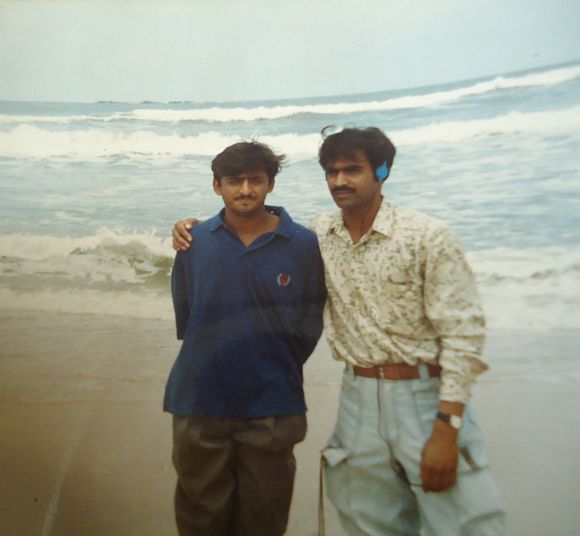
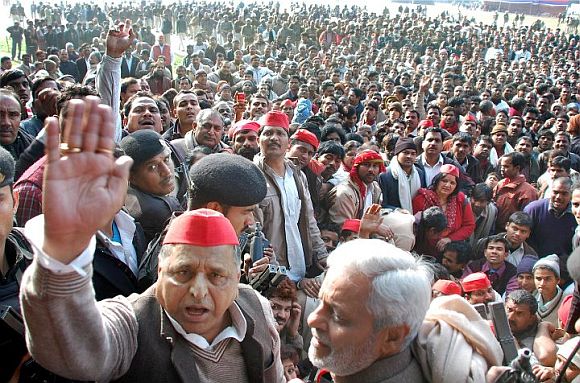
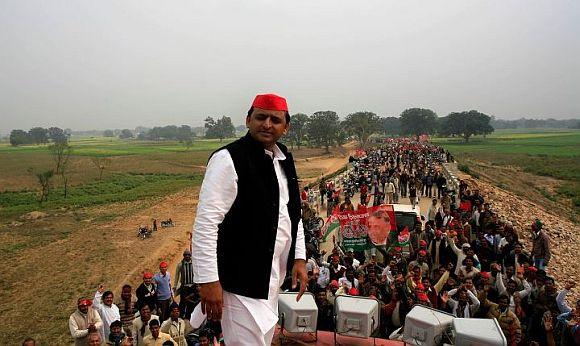
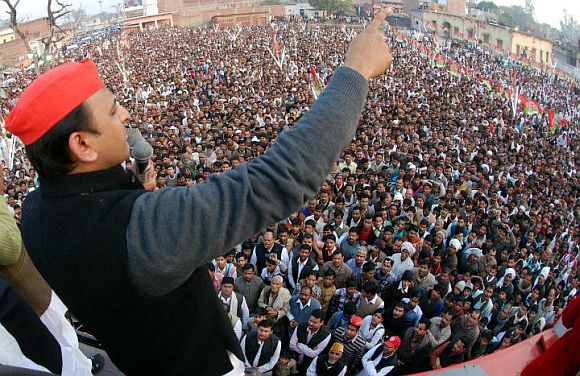
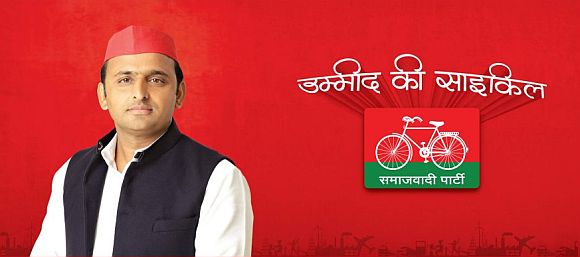

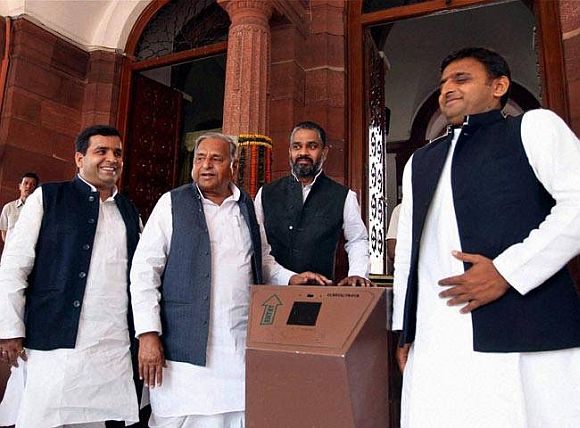


article